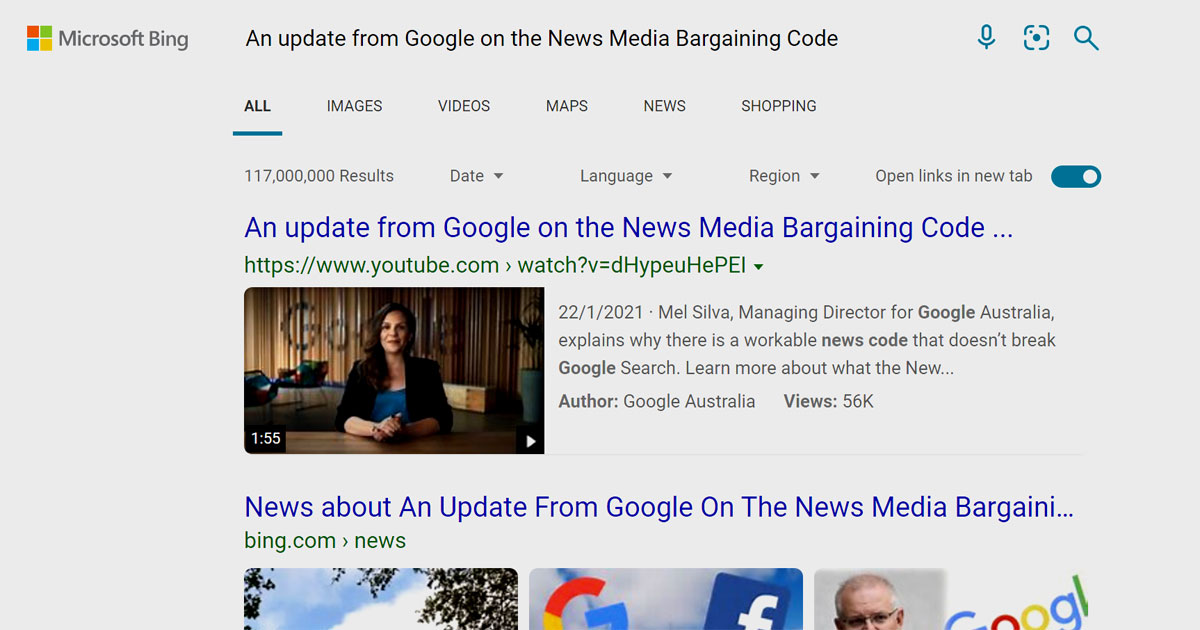A few clients have asked us whether or not they should be worried by Google's threat to remove Google Search from Australia if the government introduces its News Media Bargaining Code.
Under the code, Google would need to pay news organisations for indexing their news stories in search.
Google has threatened to close search to Australians if this becomes law, proposing instead an alternative funding model for news organisations.
In the meantime, small to medium businesses are scratching their heads and wondering whether or not all their "SEO" efforts have been wasted.
The short answer is, some have been a waste, most should not have been.
Let me explain.
Will Google really shut search in Australia
Financially, Google could easily absorb the News Media Bargaining Code costs, given how small the Australian market is in global terms.
However, the principle of the code and the fear that it will set a precedent worldwide is what would seriously impact Google Ad revenues; advertising in which ads appear within search results.
And their campaign is in full swing.
Google already has form in following through on its threats, as seen in Spain where it closed its Google News service in light of EU changes about publishers paying media organisations when articles were quoted or linked to.
According to media organisations, there was little ill effect.
Google has also taken more drastic action in China and in some other markets.
Facebook is also in the crosshairs of this new code and says it will read the draft laws when they are out and determine a position at that time.
At the same time, Rupert Murdoch's organisations (the ones that stand to gain the most) have been barracking for the government from the sidelines and generating much coverage to keep the issue alive.
So, what will fill the void if Google closes search? It almost rhymes with cha-ching
The biggest winner in the search traffic stakes will be Microsoft's Bing; the search engine whose full name might be But It's Not Google.
Google is the habitual place most of us go for searching but when it's gone, I would anticipate that Bing will fill the void.
There are other search engines, of course, but Bing is baked in to many of the Microsoft-set computer systems in large and government-run organisations, to habits will follow the course of least resistance and most of us will end up there.
For those of you wondering about your Search Engine Optimisation efforts, there should be little to fear.
If you have been following our advice, you will have been writing content that earnestly answers real and relevant questions that your audience (and potential audiences) have been asking.
We have always advised this (I certainly have, since 2005 when I ran South Australia's first ever social media marketing workshops for business, which featured blogging at its core) because this has always been what Google engineers have told us is important to their system.
Yes, that ideal was primitive in the early days of less content worldwide in which any old shamble of words could float to the top due to keyword stuffing.
But since those early days, there has been a constant refining of search engine algorithms to "cut out the crap".
Most other search engines have followed this philosophy and used similar technology to Google so if you've been doing the above, you are in good stead.
Perhaps hop over to Bing now and search for the goods or services or solutions you offer, and then do a search on your business name. This is a crude but quick way to glimpse into a possible future.
However, if you've fallen victim to the hideous SEO industry in which you are charged around $1000 a month for "SEO stuff", you probably have the most to lose because any of their Google-specific tricks or hacks are likely to be blown away like autumn leaves in the first winds of winter.
If all you've been doing is trying to "write for the search engines", that needs to change today.
As I've always said, write for humans first, Google will follow.
Now that advice will be more general.
Next steps
It you'd like to take stock of your situation, and you're in South Australia, move quickly and register to get two hours of our time, free, thanks to the Adelaide Business Hub's ASBAS program.
It only takes a minute or two to apply. More details here to get some free or subsidised marketing mentoring session.
Secondly, it would be prudent to make sure your Bing Places for Business listing is up to date, just in case. In fact, it should be, anyway, this latest scare is just a nice helpful prod.
And finally, if you have not been working deliberately to build an audience of supporters and clients and potential clients around you, so that you can email them directly when there are important messages to get across - like I'm doing now - please put some urgent attention upon this matter.
No matter whether you choose Mailchimp, Mailer Lite, or some other email newsletter system, we need to make sure you are building and strategically using your database.
So when it comes to your energy for developing content strategically to attract organic content, don't bin it, Bing it!

